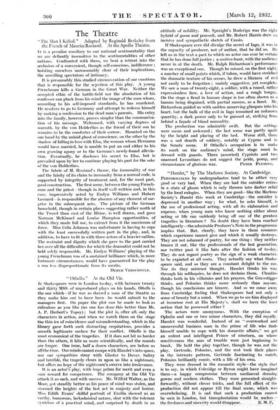The Theatre
"The Man 1 Killed." Adapted by Reginald Berkeley from the French of MauriceRostand. At the Apollo Theatre. lr is a peculiar corollary to our national sentimentality that we are defiantly insensitive to the sentimentalities of other nations. Confronted with them, we beat a retreat into the seclusion of a convenient, though self-conscious, indifference ; hoisting ourselves unreasonably clear of their implications, the unwilling spectators of intimacy, It is presumably this studied circumvention of our emotions that is responsible for the rejection of this plaY. A young Frenchman kills a German in the Great War. Neither the accepted ethic of the hattleffield nor the absolution of his confessor can pluck from his mind the image of the man whom, according to his self-imposed standards, he has murdered. Ile resolves to go to Germany and attempt to redeem himself by making a confession to the dead man's parents. His entry into the family, however, proves simpler than the communica- tion of his message. Welcomed, with varying degrees of warmth, by the von Holderlins as the friend of their son he remains to he the comforter of their sorrow. Haunted on the One hand by the unlaid ghost of conscience, on the other by the shadow of falling in love with Elsa, the woman whom Hermann would have married, he is unable to put an end either to his own growing agony or to the German's newly-found allevia- tion. Eventually, he discloses his secret to Elsa, but is prevailed upon by her to-continue playing his part for the sake of the von Holderlins.
The fabric of M. Restand*s theme, the immorality of war and the falsity of its claim to immunity front a normal code, is supported by integrity of treatment and, for the most part, good construction. The first scene, between the young French- man and the priest—though in itself well Written and, in this case, impressively acted by Etulyn Williams and Hubert Leonard—is responsible for the absence of any element of sur- prise in the subsequent acts. The picture of the German household, though in certain places suggesting rather north of the Tweed than cast of the Rhine, is well drawn, and gave Norman Meliimiel and Louise Hampton opportunities, of which they made full use, to extract from it the maximum of force. Miss Celia Johnson was unfortunate in having to cope with the least successfully written part in the play, and, in addition, to have to fit in with three actors of a heavier calibre. The restraint and dignity which she gave to the part carried her over all the difficulties for which the dramatist could not be held solely responsible. Mr. Endyn Williams' playing of the young Frenchman was of a sustained brilliance which, in more fortunate circumstances, would have guaranteed for the play a run less diSproportionate from its merits.
DEREK Viiiiscuovcr..


















































 Previous page
Previous page